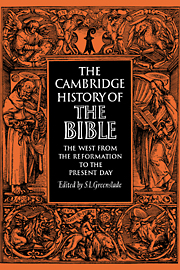Book contents
- Frontmatter
- Chapter I The Bible in the Reformation
- Chapter II Biblical Scholarship: Editions and Commentaries
- Chapter III Continental Versions to c. 1600
- Chapter IV English Versions of the Bible, 1525–1611
- Chapter V The Religion of Protestants
- Chapter VI The Bible in the Roman Catholic Church from Trent to the Present Day
- Chapter VII The Criticism and Theological Use of the Bible, 1700–1950
- Chapter VIII The Rise of Modern Biblical Scholarship and Recent Discussion of the Authority of the Bible
- Chapter IX Continental Versions from c. 1600 to the Present Day
- Chapter X English Versions since 1611
- Chapter XI The Bible and the Missionary
- Chapter XII The Printed Bible
- Chapter XIII Epilogue
- Appendices
- Bibliography
- Notes on the Plates
- Index
- Plate Section
- References
Chapter X - English Versions since 1611
Published online by Cambridge University Press: 28 March 2008
- Frontmatter
- Chapter I The Bible in the Reformation
- Chapter II Biblical Scholarship: Editions and Commentaries
- Chapter III Continental Versions to c. 1600
- Chapter IV English Versions of the Bible, 1525–1611
- Chapter V The Religion of Protestants
- Chapter VI The Bible in the Roman Catholic Church from Trent to the Present Day
- Chapter VII The Criticism and Theological Use of the Bible, 1700–1950
- Chapter VIII The Rise of Modern Biblical Scholarship and Recent Discussion of the Authority of the Bible
- Chapter IX Continental Versions from c. 1600 to the Present Day
- Chapter X English Versions since 1611
- Chapter XI The Bible and the Missionary
- Chapter XII The Printed Bible
- Chapter XIII Epilogue
- Appendices
- Bibliography
- Notes on the Plates
- Index
- Plate Section
- References
Summary
Acceptance of the King James Version
The King James version of the Bible was a revision of prior English translations. In their preface, the scholars who were charged to make this revision show that they were fully aware that their work would encounter strong opposition:
“Zeale to promote the common good…findeth but cold intertainment in the world.…Many mens mouths have bene open a good while (and yet are not stopped) with speeches about the Translation so long in hand, or rather perusals of Translations made before: and aske what may be the reason, what the necessitie of the employment: Hath the Church bene deceived, say they, all this while?… Was their Translation good before? Why doe they now mend it? Was it not good? Why then was it obtruded to the people?”
For eighty years after its publication in 1611, the King James version endured bitter attacks. It was denounced as theologically unsound and ecclesiastically biased, as truckling to the king and unduly deferring to his belief in witchcraft, as untrue to the Hebrew text and relying too much on the Septuagint. The personal integrity of the translators was impugned. Among other things, they were accused of ‘blasphemy’, ‘most damnable corruptions’, ‘intolerable deceit’, and ‘vile imposture’, the critic who used these epithets being careful to say that they were not ‘the dictates of passion, but the just resentment of a zealous mind’.
- Type
- Chapter
- Information
- The Cambridge History of the Bible , pp. 361 - 382Publisher: Cambridge University PressPrint publication year: 1963



